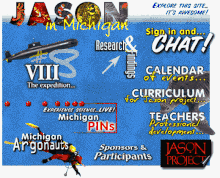| Formation | 1989 |
|---|---|
Founder | Robert Ballard |
| Website | www |
The JASON Project is a US K-12 science curriculum program that is designed to motivate and inspire students to pursue interests and careers in science, technology, engineering and mathematics.
The JASON Project's approach to science education immerses students in real-world situations where they are mentored by scientists from organizations like NASA, NOAA, the U.S. Department of Energy, and parent company National Geographic Society. JASON creates these connections using educational games, videos, live interactivity and social networking to embed its partners' research in the curriculum.
History

The JASON Project was started in 1989 by Dr. Robert Ballard, the oceanographer who discovered the wreck of the RMS Titanic.[1] The JASON Foundation for Education was founded in 1990 as a 501(c)(3) non-profit organization to administer the project. The Foundation became a subsidiary of the National Geographic Society in 2005.[2]
The project won a scientific public engagement award from the American Association for the Advancement of Science, and Computerworld's Smithsonian Award for its use of technology.[3] The JASON curricula are available in print and free online, aligned to national and state standards. The JASON Mission Center contains all student and teacher content, communications systems, digital experiences, and tools to manage, assess and track student performance and online usage.
JASON curricula are available free online, free print-on-demand and in print editions for purchase.
References
- ↑ "The JASON Project - History". Archived from the original on October 6, 2009. Retrieved August 14, 2008.
- ↑ "National Geographic Assumes Stewardship of JASON Foundation for Education". nationalgeographic.com. Archived from the original on 14 July 2011. Retrieved August 14, 2008.
- ↑ Oleson, John Peter; Pollini, John (October 2017). "Anna Marguerite McCann, 1933–2017" (PDF). American Journal of Archaeology. 121 (4): 687. doi:10.3764/aja.121.4.0685. Archived (PDF) from the original on October 26, 2017. Retrieved October 30, 2017.